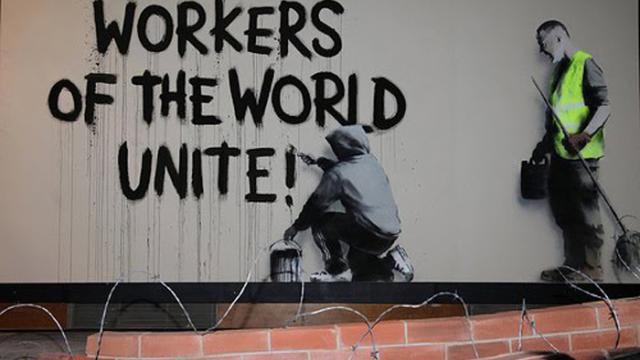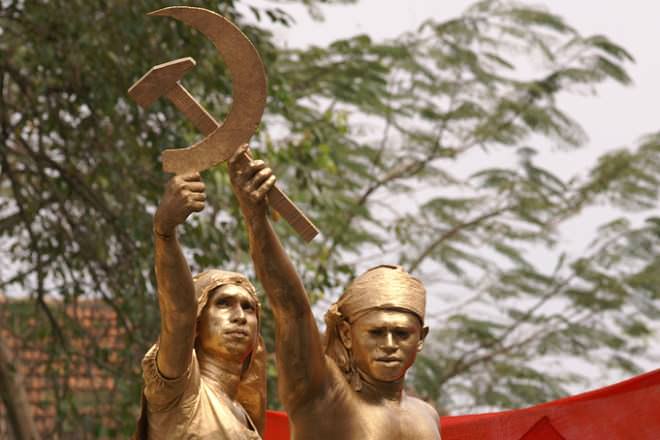
This two-part series explores how the 1% are sidestepping the growing crises generated by neoliberal policies, and attempting to extend their power with an increasingly fascist form of capitalism.
Are we moving beyond the age of neoliberal capitalism? This question is not just academic. Definitions can mean control.
It is often said that knowledge is power. Those with knowledge have power, yes. But equally, those who shape knowledge and define meaning have power. One example was Francis Fukuyama, who grandly announced that we had reached "the end of history" in 1989. With the fall of state-centric USSR communism, Fukuyama predicted that free market capitalism would amount to not only the peak, but the end, of political achievement. His statement, celebrated and treated as a mantra throughout the West, asserted the hubris of neoliberalism; the phrase "there is no alternative" was repeated so often that many believed it to be true.
But it was not.
Economist John Weeks has explained eloquently how defining the world financial system based on false economics, neoliberals created a financial order that catalysed the extraction of wealth to the 1%.
They sold this even harsher variation of capitalism with ideas such as "trickle-down economics" and the "power of markets," which were celebrated as the best way to allocate resources. Neoliberal doctrine suggested that the economic system would work for everyone.
But judging by any metric, it has failed the majority. Extreme poverty for the masses has enabled excessive wealth for the few. The neoliberal era of capitalism accelerated the exploitation of people and planet. The question is now: where do we go from here?
The End of Neoliberalism?
What has been "business as usual" for the last three decades cannot continue beyond the short term. Potential breaking points include the looming climate crisis; the overexploitation of resources; systemic problems within the financial system, where another crisis is imminent; and endemic, increasing inequality. The latter was a key driver of the 2008 financial meltdown.
All these are crises of capitalism, not least because infinite growth is impossible in a finite world. What capitalism’s latest chapter, neoliberalism, has done has accelerated the pace of extraction and exploitation. But before exploring alternatives that tackle the systemic crises and weak points of the new emerging system, first we need to identify how neoliberalism is, in fact, giving way to neo-fascism.
From Free Markets to Authoritarianism
The most discussed shift toward authoritarianism is U.S. President Donald Trump, who is taking the Republican Party with him. His attacks on press freedom, the Muslim ban, plans to build a wall and his demonization of non-white groups all echo the early stages of fascist regimes. But today Trump is not alone in this far-right lurch.
The Prime Minister of Brexit-Britain is not only holding hands with Donald Trump, she treads the same path. Similar shifts can be observed in Egypt with President Abdel Fattah el-Sisi; in Turkey with Recep Tayyip Erdogan; throughout Vladimir Putin’s reign over Russia, and in India under Narendra Modi, to name a few. There are strong concerns that other countries, including Brazil and France, could follow this year.
Focusing on Brexit-Britain and Trump’s U.S., there are four significant breaks with neoliberalism.
1. Anti-establishment Propaganda
Both Brexit and Trump have sold themselves with anti-establishment populism. In action, the way that Brexit was bankrolled by billionaires contradicts this; even more so the way Trump is a billionaire himself. Through his appointments Trump has hardly "drained the swamp." Rather, it is more packed with swamp creaters than ever.
Equally, the British population who were promised to "take back control" through Brexit are now led by an unelected leader in a government as full of corporate stooges as before. Westminster has particularly been overrun by climate denying oil industry insiders. Despite these connections, the surface rhetoric remains against neoliberal pro-business elites.
2. Nationalism on the Rise
Instead the blame for the way neoliberalism has made the 1% rich and everyone else poor is targeted against "outsiders." During the neoliberal period, in language at least, the world system was supposed to be a sea in which all boats rose. The regressive period was shrouded in the language of universal progression.
In sharp contrast, the new Brexit-Trump agenda is overt in that it will exclude others through walls, such as the anti-migration wall built in Calais, France. Both governments use either coded or clearly racist and prejudiced language to erode civil liberties and rights. As I reported last week for this publication, on both sides of the Atlantic a massive crackdown on civil liberties and freedom of expression has gotten underway.
Another key divergence from administrations before them are the signals that neither Britain nor the U.S. will ratify agreements on climate change, whereas neoliberals at least paid lip-service to the crisis.
3. Protectionism in Trade
This nationalist language is echoed in a seismic shift for future U.S.-UK trade and international relations. Both are leaving – or at least speaking about leaving – the main parts of the neoliberal architecture. These include the EU, NAFTA and TTIP. The future of the World Bank, IMF and even NATO are questioned.
But the critique to these neoliberal institutions is far from progressive. Instead, Trump wants to push an "America First" policy, heralding a return to pre-WWII protectionism. Again trying to resurrect previous policies, Britain plans to leave the EU single market. Senior government ministers have received a great deal of critique and derision for suggesting Britain rekindle its imperial ties, in what has been dubbed “Empire 2.0.”
4. From No Alternative to "No Truth"
On climate change the science is clear. We cannot continue with a carbon based capitalism. This and other systemic crises are uncomfortable home-truths that threaten the 1% in a neoliberal system.
The apparent solution – for Trump-Brexiteers – appears to move from climate denial to denying everything. In the last era of capitalism we were told there is no alternative; it was a system based on false economic rules. It seems the emerging authoritarianism has taken this ideology one step forward, denying that truth itself exists. When U.S. Counselor to the President Kellyanne Conway described "alternative facts," she summed up this post-truth politics.
The emerging authoritarianism is a work in progress. It both has the power to remake capitalism, yet it has fundamental weak spots. Next week, Part II of this series will explore how to crack the system and explore alternatives.
3 WAYS TO SHOW YOUR SUPPORT
- Log in to post comments












